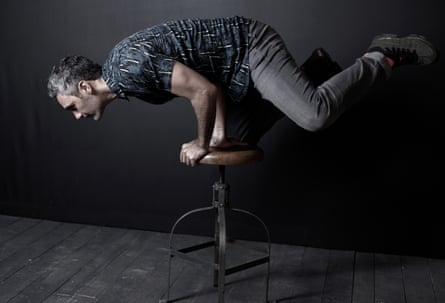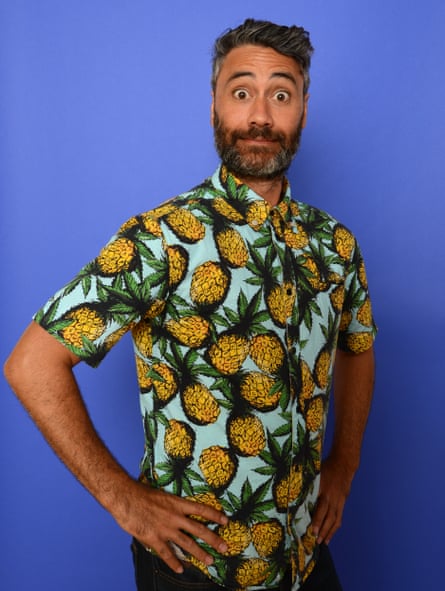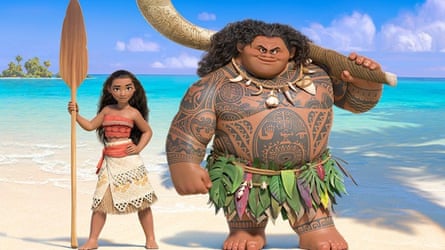When asked what fans can expect from the latest instalment of Thor, director Taika Waititi somewhat unhelpfully says it will be “Taika-esque”.
Asked if he could perhaps describe it in literally any other way, he laughs. “I can’t! There’s no way!”
As far as whetting the appetites of Marvel fanatics goes, it’s a little counterproductive. Thor: Ragnarok will be watched by many more people who are familiar with the franchise than those who know Waititi’s work – but this may be the film that makes the New Zealand director a household name.
The big-budget Thor is a far cry from the Flight of the Conchords, of which Waititi wrote and directed a few episodes, and from What We Do In The Shadows, the 2014 vampire mockumentary he made with Jemaine Clement. And it’s almost the antithesis of Hunt for the Wilderpeople: the family friendly little-Kiwi-film-that-could, which was a surprise hit at box offices around the world last year.
But while the types of projects may differ wildly, his treatment of them – the bit that makes them “Taika-esque” – doesn’t. Even Waititi’s government-funded anti-drug-driving campaign, Tinnyvision – made in collaboration with Snapchat in 2014 – has the same warm, sly humour of his features.
And yet, after 41 years’ experience of being “Taika-esque” himself, he still struggles to describe it.
“If someone asked, ‘What are your films like?’, the best I can come up with is that they’re, like, a fine balance between comedy and drama. And they deal mainly with the clumsiness of humanity.”
Well, that’s definitely true of Tinnyvision.
As evidenced by his decision to set Ragnarok outside the Marvel universe – a ballsy move, given the size of the fandom and budget in question – Waititi is one to do things his own way. And it’s paying off.
Hunt for the Wilderpeople reportedly made as much as US$23m worldwide (with takings of more than $8m in its home country) and spent some eight weeks in the top 10 at the Australian box office. It placed among the top 100 films of all time on Rotten Tomatoes, where it is 97% “certified fresh” from 171 reviews, and was the New York Times and LA Times’ critics’ pick, as well as Empire magazine’s film of the year.
“I knew it would play well with audiences, I just didn’t know if anybody would have any idea how to market it or sell it or get people in cinemas to see it ... It’s not like [New Zealand is] known for churning out really big blockbusters every year.”
At home, Waititi has gone from hit to bigger hit. His first feature film, the oddball romantic comedy Eagle vs Shark, was nominated for the grand jury prize at the Sundance film festival in 2007 – as was his second, Boy, in 2010.
He may not be quite as big a celebrity as his long-time collaborator Clement, with whom he won New Zealand’s top comedy award as the Humourbeasts in 1999, but he’s close. And when Hunt for the Wilderpeople became the highest-grossing local film at the New Zealand box office in May last year, it broke Boy’s record. (At the time, Waititi called it “the happiest and saddest day of my career”.)

In late February, Waititi was named the New Zealander of the year. I ask where the honour ranks in among nominations at the Academy Awards and Sundance and wins at festivals in Berlin, Edinburgh, Hawaii, Melbourne, Taipei, Toronto and Warsaw.
“It’s up there,” he answers. “There are a lot of nominations for things I never won and this is something I actually did win – it feels like I’ve followed through on this one.”
Waititi’s Academy Award nomination came in 2005 – before any of his feature films – for his 11-minute short Two Cars, One Night. He infamously pretended to be asleep during the ceremony.
That outsider’s mentality has persisted, despite the successes of the interim 12 years. The best picture fiasco of this year’s Academy Awards was “great”, he says. “I loved it. I thought it was hilarious ... They take this stuff so seriously, don’t they? It’s almost like launching a rocket into space.”
Keeping a home far away from Hollywood has been grounding for Waititi; it’s hard to get caught up in all the glitz and self-importance from New Zealand, where he and his family are based. He has two daughters, aged four and one, and a stepson with his wife, the producer Chelsea Winstanley.
But another way to look at his geographical distance is as a buffer, or a safety net. You can always go home again – and why wouldn’t you, when you’re already a massive success there?
“Having had pretty much four successful films at home, I know there’s an audience for my work,” he says. “A lot of people are trying to get out of their home country and think ‘making it’ is if you’re able to work in another. For me ... I’d be quite content to keep doing my own little films down there for the rest of my filmmaking career.”
The New Zealand Film Commission will be glad to hear that, I say.
“That’s why I said it,” he replies.
That may all change, with Thor: Ragnarok set to be by far the biggest commercial success of his career to date. (Thor: The Dark World made $644m worldwide in November 2013.)
With Cate Blanchett, Jeff Goldblum and Wilderpeople star Sam Neill joining Chris Hemsworth and Mark Ruffalo, anticipation is high for the third instalment of the franchise – not least because Waititi, with his background in indie comedies, was such an unusual pick.
The day we speak, the first stills from the film have been released, with Blanchett, Hemsworth and Tessa Thompson in character on the cover of Entertainment Weekly.
Social media is delighted with Goldblum’s turquoise eyeliner (“If the new Thor film is nothing but Goldblum sitting silently looking like this, then I will still see it six times,” says one tweeter) but mixed on Hemsworth’s short hair.
Waititi is unfazed: “Crazier things happen to Thor than new hair.”
His apparent lack of reverence for the Marvel universe – illustrated in part by the mockumentary-style teasers that have been released in the film’s lead-up – led Forbes to call Ragnarok the studio’s “wild card” for 2017; others have taken it as a vote of confidence in Waititi’s pitch.
“Why am I excited for Thor: Ragnarok?” wrote film critic Sarah Marrs. “Because Taika Waititi talked Marvel into overhauling an entire franchise, AND THEY LET HIM.”
Waititi says. “I’ve always felt that I wanted to make a Marvel film ... I just want to make sure I’m not making an episode.”
With the film due out in November, he will be based in Los Angeles until the end of the year. For the first time ever in his career, he has an office, he says. The challenge seems to be battling against his short attention span.
“With Thor, I’m trying not to do any other things. ... There’d be nothing worse than the film not being as good as I think it’s going to be because I didn’t spend enough time on it. I don’t want my focus pulled away, as it usually is.”

Still, he admits he’s starting to make plans for life after Ragnarok, considering which of four of his own scripts to tackle next – “something super-fast and a bit more carefree”. A werewolf spin-off of What We Do In The Shadows and the stop-motion animation Bubbles, about Michael Jackson’s pet chimp, are also on the cards.
Waititi likens his approach to filmmaking to a buffet. “I want to try every little every thing from either end. I don’t want to go straight to the chicken. I’ll put some grapes on the plate, a bit of gravy and mix it all up.”
But that analogy – the mixing of the grapes with the gravy – suggests an indiscriminate approach, when Waititi is picky about what projects he takes on – particularly when others’ ideas tend to interest him less than his own. Ragnarok was not the first big-budget Hollywood script he’d been sent, he says – it was simply the first he’d felt moved to take up.
Waititi wrote the first script of the Disney animation Moana before opting in 2012 to return to New Zealand to make What We Do In The Shadows. He’d just had a child. “I basically didn’t want to be living here, working in an office, writing someone else’s movie,” he says.
All that remains of his original script is “EXT: OCEAN – DAY”, he jokes. But the final product was “good”.
“I was relieved it was not insulting to Pacific cultures. That was a big worry for me. I was very nervous about it. You often ask yourself, ‘Oh my god, do I get involved with something like this?’”
Waititi is half-Māori himself and much of his work is steeped in New Zealand’s indigenous culture, celebrating that which makes it unique – particularly its humour – while not shying away from the challenges it faces. (His attention goes beyond simple representation: he said hiring Indigenous people to work on Thor was his “responsibility” as a filmmaker.)
Boy, set in the remote coastal village where Waititi grew up, revels in the comedy and joy to be found in the midst of poverty. He told NPR that part of its appeal was that it did not perpetuate stereotypes: “Indigenous people in films, it’s all like nose flutes and panpipes and, you know, people talking to ghosts ... which I hate.”
These considerations were front of mind when he was approach for Moana. “I thought, well, the best way of them not making something that’s insensitive or shallow was to involve people from that community, from the Pacific ... If there’s some way I could be at the table and help try and make this not a bad film, then I’ll try.”
His involvement ended with the first draft. “It wasn’t anything to do with the process, I just got b–”. He stops short of saying “bored” but not quite short enough. “Like I do all the time, I just ended up wanting to do my own thing again and make a vampire movie instead.”
Waititi’s script – focusing more on Moana’s family relationships – contributed an irreverent, “very Pacific humour” to the film, according to producer Osnat Shurer. Shurer also said it gave the filmmakers “permission to continue down that road, because he’s from that culture”.
Waititi thinks they could have taken it further. “I know the danger is they’ve got to be respectful but Pacific islanders and Polynesians have some of the least respectful humour on the planet,” he says, laughing.
“[But], as Americans making a film about another culture, and having been criticised in the past for their depictions of minorities, they have to be a bit safer.”
At least there’s a Polynesian Disney princess now, I offer? Waititi doesn’t sound convinced: “Yeah. I guess so. Yeah. I dunno. Haha! I dunno. Luckily, through the phone, you can’t see my face.”

Waititi is not good at censoring himself – or, at least, not fast enough. He often stops himself short as, I imagine, he pictures his words in print and what doors they might close for him. One he seems happy to shut himself is a future biopic, which he volunteers as “the worst type of movie”, committing the cardinal sin of being boring.
“They’re always subject to such scrutiny. Like ... ‘Oh, they really learned to play piano, they went around wearing blue suede shoes for the entire shoot’.
“I think, why is that interesting for an actor? Who cares?”
The way Waititi hates biopics, I note, is the way many people hate films like the Marvel movies: big blockbuster franchises built on sequels to sequels, held up as the antithesis of the small indie films he’s best known for back home. Is it possible for the two to coexist?
“So far they’re existing well for me,” he says. “I know that after this I’ll go back and do an independent film. Then I’ll hopefully come back and do another studio thing. I would kind of like to dwell between both worlds.”

Comments (…)
Sign in or create your Guardian account to join the discussion